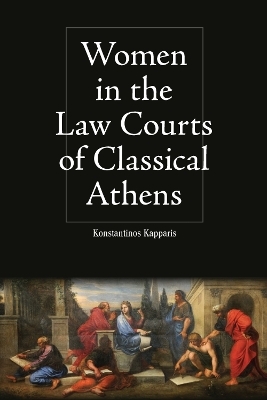
Women in the Law Courts of Classical Athens
Seiten
2022
Edinburgh University Press (Verlag)
978-1-4744-4673-0 (ISBN)
Edinburgh University Press (Verlag)
978-1-4744-4673-0 (ISBN)
Explores the intersection of gender with important aspects of Athenian society such as citizen status, social values and beliefs, class, economic capacity and legal standing
Explores the intersection of gender with important aspects of Athenian society such as citizen status, social values and beliefs, class, economic capacity and legal standing
Discusses how different groups of women, such as citizens, metics, alien and native sex workers, and slaves interacted with law enforcement and the extent to which these groups had access to key institutions in the Athenian Democracy
For the first time throws some light upon several fascinating fragments, like the two speeches Against Aristagora, or the case against Timandra
Discusses the recent suggestion of a witch-hunt" in 4th century Athens
Konstantinos Kapparis challenges the traditional view that free women, citizen and metic, were excluded from the Athenian legal system. Looking at existing fragmentary evidence largely from speeches, Kapparis reveals that it unambiguously suggests that free women were far from invisible in the legal system and the life of the polis.
In the first part of the book Kapparis discusses the actual cases which included women as litigants, and the second part interprets these cases against the legal, social, economic and cultural background of classical Athens. In doing so he explores how factors such as gender, religion, women's empowerment and the rise of the Attic hetaira as a cultural icon intersected with these cases and ultimately influenced the construction of the speeches.
"
Explores the intersection of gender with important aspects of Athenian society such as citizen status, social values and beliefs, class, economic capacity and legal standing
Discusses how different groups of women, such as citizens, metics, alien and native sex workers, and slaves interacted with law enforcement and the extent to which these groups had access to key institutions in the Athenian Democracy
For the first time throws some light upon several fascinating fragments, like the two speeches Against Aristagora, or the case against Timandra
Discusses the recent suggestion of a witch-hunt" in 4th century Athens
Konstantinos Kapparis challenges the traditional view that free women, citizen and metic, were excluded from the Athenian legal system. Looking at existing fragmentary evidence largely from speeches, Kapparis reveals that it unambiguously suggests that free women were far from invisible in the legal system and the life of the polis.
In the first part of the book Kapparis discusses the actual cases which included women as litigants, and the second part interprets these cases against the legal, social, economic and cultural background of classical Athens. In doing so he explores how factors such as gender, religion, women's empowerment and the rise of the Attic hetaira as a cultural icon intersected with these cases and ultimately influenced the construction of the speeches.
"
Konstantinos Kapparis is Professor of Classics and Director of the Center for Greek Studies at the University of Florida.
| Erscheinungsdatum | 16.08.2020 |
|---|---|
| Reihe/Serie | Intersectionality in Classical Antiquity |
| Verlagsort | Edinburgh |
| Sprache | englisch |
| Maße | 156 x 234 mm |
| Themenwelt | Geschichte ► Teilgebiete der Geschichte ► Militärgeschichte |
| Recht / Steuern ► Rechtsgeschichte | |
| Sozialwissenschaften ► Soziologie ► Gender Studies | |
| ISBN-10 | 1-4744-4673-6 / 1474446736 |
| ISBN-13 | 978-1-4744-4673-0 / 9781474446730 |
| Zustand | Neuware |
| Haben Sie eine Frage zum Produkt? |
Mehr entdecken
aus dem Bereich
aus dem Bereich
neueste Manipulationstechniken als Waffengattung der NATO
Buch | Softcover (2023)
Westend (Verlag)
CHF 33,55
Deutschlands Schwäche in der Zeitenwende
Buch | Softcover (2023)
C.H.Beck (Verlag)
CHF 25,20


